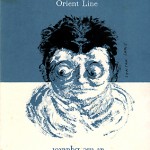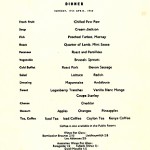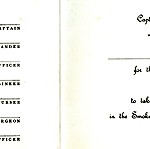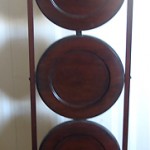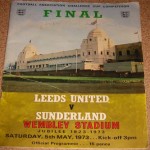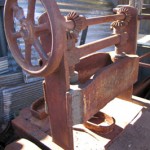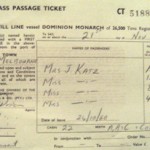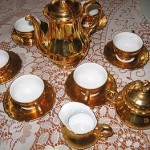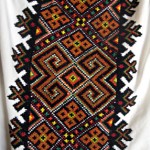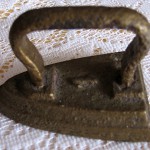English
London, England
Tilbury, London on 28 March 1960
Sydney on 4 May 1960
Kiosk at Morisset Hospital, Hunter region, NSW
Uncle’s kiosk business at Morisset Hospital
Childcare and drycleaning work at Morriset; nurse at Royal Newcastle Hospital.
I was born in England on 3 June 1929. My maiden name was Lillian June Eve Oakenfull.
In England, I was very happily married and the mother of two children. We lived just a normal life. I worked in the same place as my husband for many years and we were transferred when a new firm opened up. We lived in Hampshire in the far south of England. I had three brothers and none of them came out to Australia to live. Only one brother has come out for a holiday.
We decided to come out to Australia because my uncle, who was a limbless returned soldier (he had lost a leg), had a kiosk business at Morisset Hospital on Lake Macquarie near Newcastle. He had worked there for a few years after he had come back from a prisoner of war camp in Germany and wrote to us to ask us if we would like to come and work. As my husband had been in his job in England for 12 years, he thought that a change would be great. So we said we would come.
We came straight to Morisset. We travelled on the ship SS Orontes and were called ‘ten pound Poms’. We left from Tilbury Docks in London on 28 March 1960 when my daffodils in my garden in Hampshire were in full bloom. I found it very hard to leave them; it broke my heart.
I have these menus from the ship and one in particular was a special menu for crossing the equator at 9am on the morning of 17 April 1960; the food was great on the ship. The other document here is an invitation from the captain of the Orontes, Captain R.W. Roberts, “to take cocktails with him and his Officers in the Smoke Room on ‘E’ deck aft, at 7:30pm on Friday, 22nd April, 1960”. I had helped children with swimming on the ship, which is why we received the invitation.
It took five weeks to sail out here to Australia and we docked at six ports: Port Said near the Suez Canal, Aden, Perth (Fremantle), Adelaide, Melbourne and finally Sydney.
These are some documents from the Orient Line given to passengers that outline the history of each of the ports where we stopped. The Maritime Museum in Newcastle would like to have them as part of the history of the SS Orontes.
This beautiful jewellery box was bought in Port Said. My children thought it was pretty so we got it for them from the ‘bumboats’ that used to come alongside the ships. We didn’t get off the boat in Port Said because there was trouble there; [it was said] they didn’t like the British. We were allowed off in Aden [in Yemen] and I found the smells of the beautiful frangipani and the filthy poverty overwhelming. That was the first time I had smelt or seen a frangipani and the two smells were just worlds apart.
Before we left England, the man who interviewed us about coming out here had said, “Of course, you can’t help but be impressed by Sydney Harbour Bridge; you will probably go under it at dawn,” and we did on the 4th of May 1960 and it was impressive. We thought that was great. Then we went to shore and after collecting our baggage, my uncle met us and drove us from Sydney to Morisset along the old Gosford road. Because he drove so fast I thought I had come here to die; all those bends and the steep drops on the sides of the roads!
Australia was as I imagined it but I had no idea how vast it was. The weather was lovely and in the first year, we swam at the beach in Newcastle in winter and people thought we were mad. We both worked at the kiosk at Morisset Hospital and we lived in rooms at the kiosk. Looking back, I think we should not have worked and lived on site – we would have been more involved with the community and met more people. The nurses and other staff used to visit to get their food and would say, “See you later”. In England when you say, “See you later”, you mean, “I will see you later this evening”. When they didn’t come back that evening, I thought they didn’t like us.
The girls were in school at Morisset and I got a shock I can tell you when I took them there because the grounds were all gravel [and the] children were in their bare feet.
I am not criticising, but it just seemed to me that then [Australia] was 50 years behind the times to what I had been used to. I think I cried every night for six months until I could go home. We were at Morisset for two years and then we went back to England because I was so homesick. We had the girls and all our baggage to take back. We arrived in 1960 and left in 1962. We had to stay the full two years because we’d had assisted passage to get us out. If we didn’t stay the two years, we had to pay the full fares and we couldn’t do that. We went back home on the Castel Felice.
The cake stand made the two trips. A very dear aunt gave it to me. It is Victorian and folds down so it was easy to bring over in our luggage.
When I got back home to England I realised I had been unfair, that I hadn’t given it a proper chance. There were a number of reasons why we decided to come back to Australia. One was that we hit the worst winter seen in England for 180 years. The snow was piled up on either side of the road. I locked myself out of the house and had to go to a neighbour to use their phone to get my husband, Frank, to come home. At that stage, he only had a bike and his fingers were nearly frozen to the handlebars by the time he got home.
Then we got a letter from Mrs Henderson who was the manager’s wife at Morisset Hospital. She was very good to me and knew I loved gardening; she had the most beautiful garden. Once she’d said to me, “Mrs Webb, make up your mind whether you go home or not, but enjoy the rest of your stay,” and they were the wisest words I ever heard. I had letters from her and my aunt and various other people wishing we were back in Australia. The day I locked myself out in the snow I said to my husband, “Do you want to go back, Frank?”, and he said, “Do you?”, and that was it. I did two jobs and Frank did one to save up enough to come back again in 1963.
One daughter didn’t take kindly to being what she called ‘filled in’ in England because the houses were too close together. At Morisset Hospital, there was a horse she could ride in open spaces. She has always been an outdoors person and that was another reason why we came back.
We were called ‘ten pound Poms’ when we [originally] came out, and when we returned [to Australia] we were called ‘boomerangs’. We sailed in 1963 on the Aurelia. I am not real sure of the dates.
We went back to the kiosk to work because they were desperate to have somebody there and we stayed about a year. Then my husband got a job in Newcastle with Titans [engineering firm] on the clerical staff and we moved into the Morisset township at the same time. We bought a little old miner’s cottage, falling to pieces, but we did it up. Eventually we wanted to move nearer to Newcastle because my husband drove an hour each way to work.
I had all the odd jobs imaginable in Morisset: picking up children, looking after children and working in the dry cleaners. I just filled in time. I applied to work at Morisset Hospital but I didn’t get a job because there was a long waiting list. But the same week we moved to Newcastle, I got a letter to say I had a job at the hospital!
At Morisset, I went around and got a petition up about getting a phone box because there wasn’t any in the area and nobody had a phone in those days. There was only one lady who had a phone and she got fed up with everybody wanting to use it. The week I left to go to Newcastle in 1970, Morisset got a phone box outside of the school.
When we moved to Newcastle we came straight [here], bought the land and built this house ourselves. We have lived here for 39 years. There were lots of things we should have done but we couldn’t afford to do at the time.
In November 1970, I started work at the Royal Newcastle Hospital and stayed there for about 20 years. I did a nurse’s aide course and became a nurse. Eventually I worked in the cardiology area as a technician doing ECGs, stress tests and so forth. My eldest daughter had left school and was working and our youngest finished her schooling off at Morisset High School. She travelled on the train to school for her last year. My husband stayed with his job until he retired.
I was desperately sorry to see the Royal Newcastle Hospital close down. I still am when I see those luxurious apartments advertised for that site; I remember how good it was for the patients to look out and see that beautiful view [over the ocean].
I always made my presence felt [at the local] Neighbourhood Watch and I wrote to council if I felt there was anything wrong. The last thing I was involved in was stopping the Telstra tower coming [here]. I also play croquet and used to go into the WEA (Workers Educational Association) to do some of their lectures.
We have been healthy, which is a big thing, and have seven grandchildren and five great-grandchildren. Just watching them grow up have been important milestones for me. One granddaughter was in the Beijing Olympic Australian softball team and they came back with a bronze medal.
It’s been a very good life in Australia and we have been very, very lucky. I did miss leaving my family behind, though. When I go back to England to see my family and old school friends, who I have known from the age of ten and still write to, I tell them that we have everything in Australia!



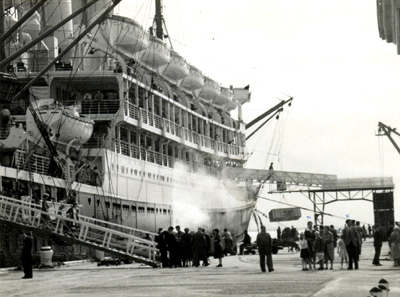


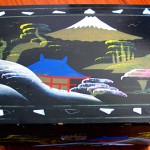
!["These [were] given to Orient Line passengers outlining a history of each port we stopped [at]."](../../../cms/wp-content/uploads/2009/08/webb-port2-150x150.jpg)
!["These [were] given to Orient Line passengers outlining a history of each port we stopped [at]."](../../../cms/wp-content/uploads/2009/08/webb-port-150x150.jpg)
